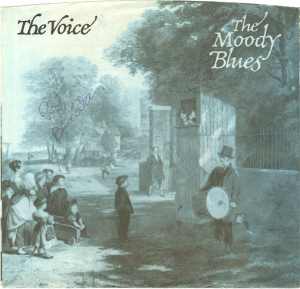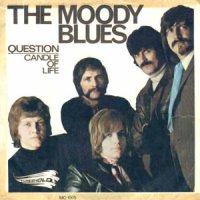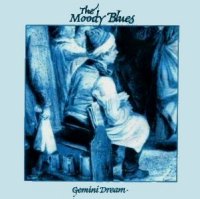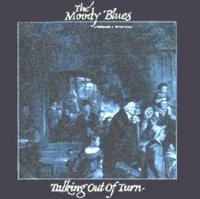Related Research Articles

The Moody Blues were an English rock band formed in Birmingham in May 1964. The band initially consisted of Graeme Edge (drums), Denny Laine (guitar/vocals), Mike Pinder (keyboards/vocals), Ray Thomas (multi-instrumentalist/vocals), and Clint Warwick (bass/vocals). Originally part of the British beat and R&B scene of the early–mid 1960s, the band came to prominence with the UK No. 1 and US Top 10 single "Go Now" in late 1964/early 1965. Laine and Warwick both left the band in 1966, with Edge, Pinder and Thomas recruiting new members Justin Hayward (guitar/vocals) and John Lodge (bass/vocals). They embraced the psychedelic rock movement of the late 1960s, with their second album, 1967's Days of Future Passed, being a fusion of rock with classical music that established the band as pioneers in the development of art rock and progressive rock. It has been described as a "landmark" and "one of the first successful concept albums".

A Question of Balance is the sixth album by the Moody Blues, released in 1970. The album reached No. 1 in the United Kingdom and No. 3 in the United States.

Every Good Boy Deserves Favour is the seventh album by The Moody Blues, released in 1971. The album reached No. 1 on the British album chart, in addition to a three-week stay at No. 2 in the United States, and produced one top-40 single, "The Story in Your Eyes".

Graeme Charles Edge was an English musician, songwriter and poet, best known as the co-founder and drummer of the English band the Moody Blues. In addition to his work with the Moody Blues, Edge worked as the bandleader of his own outfit, the Graeme Edge Band. He contributed his talents to a variety of other projects throughout his career. In 2018, Edge was inducted into the Rock and Roll Hall of Fame as a member of the Moody Blues.
"Veteran Cosmic Rocker" is a 1981 song by the progressive rock band the Moody Blues. It was written by the band's flautist Ray Thomas. "Veteran Cosmic Rocker" first appeared as the final track of the Moody Blues' 1981 album Long Distance Voyager, and was later released in November 1981 on the B-Side of "Talking Out of Turn."

"The Voice" is a song written by Justin Hayward that was first released on the Moody Blues' 1981 album Long Distance Voyager and also as its second single. The song continued the success of previous single "Gemini Dream", becoming a Top 40 hit on the Billboard Hot 100, where it peaked at No. 15 in October 1981. The song had previously topped the Billboard Top Rock Tracks chart for four weeks during June–July 1981. The song also reached No. 9 in Canada.

"For My Lady" is a song written by Ray Thomas that was released on the Moody Blues 1972 album Seventh Sojourn. It was also released as the B-side to the single "I'm Just a Singer ".

"Question" is a 1970 single by the English progressive rock band the Moody Blues. It was written by guitarist Justin Hayward, who provides lead vocals. "Question" was first released as a single in April 1970 and remains their second highest-charting song in the UK, reaching number two and staying on the chart for 12 weeks. The song reached number 21 on the Billboard Top 40 in the USA. It was later featured as the lead track on the 1970 album A Question of Balance. The single also features the song "Candle of Life" on its B-side, which was from the Moody Blues' previous album To Our Children's Children's Children.

"Gemini Dream" is a song written by Justin Hayward and John Lodge that was released by The Moody Blues on their 1981 album Long Distance Voyager and also as the lead single from the album. It reached number 12 on the US Hot 100, as well as number 1 on the Canada RPM Top 100 Singles chart. It ranked as the 28th biggest Canadian hit of 1981.

"Talking Out of Turn" is a 1981 single written by John Lodge and first released by the Moody Blues on their 1981 album Long Distance Voyager. It was also released as the third single from the album in November 1981 with "Veteran Cosmic Rocker" on the B-side.

"The Other Side of Life" is a 1986 single written by Justin Hayward and first released by The Moody Blues in May 1986 as the title track on the album The Other Side of Life. It was released as a single in August 1986, the second single released from the album, the first being "Your Wildest Dreams". After its release, it became a modest success in the United States, making #11 and #18 on the adult contemporary and mainstream rock charts respectively. It also reached #58 on the Billboard Hot 100 chart.

"Blue World" is a 1983 single by the Moody Blues written by Justin Hayward. It was first released in the UK as the lead single of the album The Present in August 1983. It was released as single in the US in the Fall of 1983. "Blue World" was one of three singles from The Present, with the others being "Sitting at the Wheel" and "Running Water." The single's cover is a pastiche of the painting Daybreak by Maxfield Parrish.

"Sitting at the Wheel" is a 1983 hit single by The Moody Blues, written by John Lodge. It was released in the US as the lead-off single from The Present in August 1983 and debuted on the Billboard Hot 100 on September 3, 1983. In the UK, "Sitting at the Wheel" was released in November 1983 as the second single from The Present, following "Blue World".

Live at the Isle of Wight Festival 1970 is a live album by the Moody Blues that consists of their live performance at the Isle of Wight Festival in 1970. The album was released in 2008.

Michael Thomas Pinder was an English rock musician. He was a founding member and the original keyboard player of the rock group the Moody Blues. He left the group following the recording of the band's ninth album Octave in 1978. Pinder was renowned for his technological contributions to rock music, most notably in the development and emergence of the Mellotron in 1960s rock music. In 2018, he was inducted into the Rock and Roll Hall of Fame as a member of the Moody Blues. He was the last surviving member of the group's original lineup.

Days of Future Passed Live is a live album by The Moody Blues that consists of their live performance at the Sony Centre for the Performing Arts in Toronto in 2017. The album was released on 23 March 2018.
"Meanwhile" is a song written by Justin Hayward that was released on the Moody Blues 1981 album Long Distance Voyager. Although never released as a single, it reached #11 on the Billboard Mainstream Rock chart.

"22,000 Days" is a song written by Graeme Edge that was first released by the Moody Blues on their 1981 album Long Distance Voyager. It was also released as the B-side to the top-ten single "The Voice". "22,000 Days" reached No. 38 on the Billboard Top Rock Tracks chart.

"Melancholy Man" is a song written by Mike Pinder that was first released on the Moody Blues' 1970 album A Question of Balance. It was also released as a single in some countries, but not in the UK or US, although in the US it was later released as the b-side of "The Story in Your Eyes".

"Running Water" is a song written by Justin Hayward that was first released on the Moody Blues' 1983 album The Present. It was released as the third single from the album in the United States but did not chart.
References
- 1 2 3 4 5 6 Murley, Mark (Winter 1996). "The Making of 'A Question of Balance'". Higher and Higher. No. 33. pp. 18–19. Retrieved 2024-03-09.
- 1 2 3 4 5 6 Freakes, Geoffrey (2019). The Moody Blues: Every Album, Every Song. Sonicbond. p. 63. ISBN 9781789520422.
- ↑ Johnson, Jared (31 October 1970). "Question of balance". The Morning News. p. 31. Retrieved 2024-03-10– via newspapers.com.
- ↑ Dunbar, Dirk (2017). Renewing the Balance. Outskirts Press. p. 171. ISBN 9781478755050.
- 1 2 3 Planer, Lindsay. "Dawning Is the Day". Allmusic. Retrieved 2024-03-10.
- 1 2 3 4 Cushman, Marc (2018). Long Distance Voyagers: The Story of The Moody Blues Volume 1 (1965 - 1979). Jacobs Brown Press. pp. 312, 326–327, 329. ISBN 9780999507803.
- ↑ Everett, Walter (1999). The Beatles as Musicians: Revolver through the Anthology. Oxford University Press. p. 186. ISBN 9780198029601.
- ↑ Hilburn, Robert (18 October 1970). "Do Best-Sellers Mean Quality?". Los Angeles Times. p. 43. Retrieved 2024-03-10– via newspapers.com.
- ↑ Sparacio, Steve (9 June 1971). "R.P.M." Berwyn Life. p. 23. Retrieved 2024-03-10– via newspapers.com.
- ↑ Morgan, Diane (8 July 1973). "The Disc Seen". The Press Democrat. p. 52. Retrieved 2024-03-10– via newspapers.com.